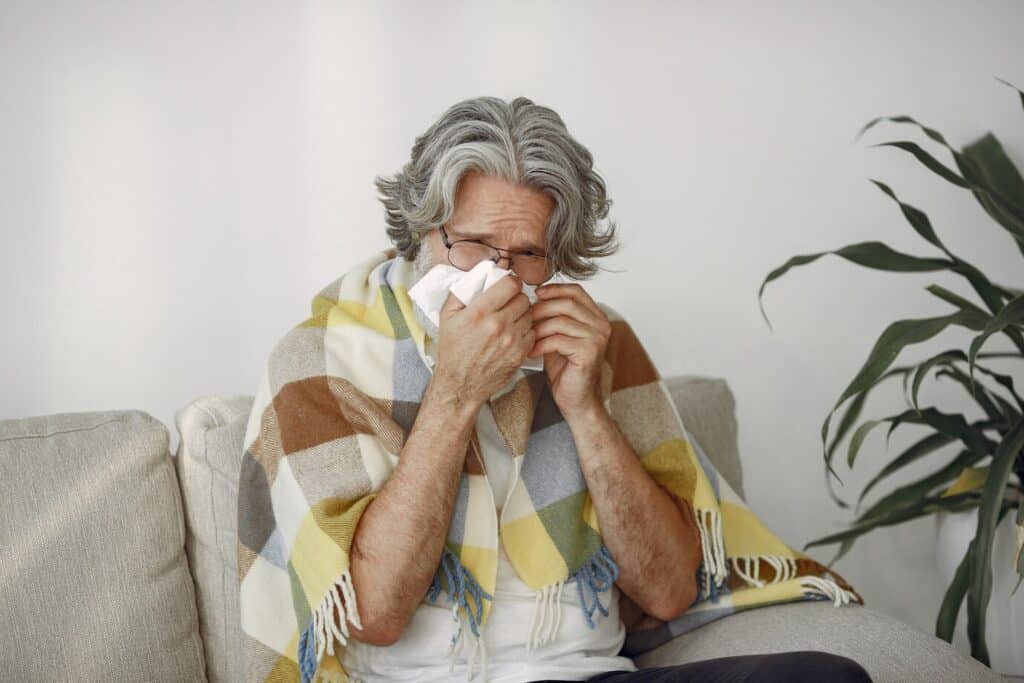As you age, your body’s defenses weaken, making you more susceptible to infections like pneumonia. According to Pneumonia In The Elderly, this severe and potentially life-threatening condition affects millions of seniors every year. At Westmont of La Mesa, we understand the importance of staying informed about pneumonia, its signs, causes, and risks, especially for seniors in La Mesa, CA. Knowing what to look out for and taking preventive measures can reduce your risk of developing it and ensure a healthier, happier life. In this article, we’ll examine the world of pneumonia, exploring its signs, causes, and risk factors and providing valuable insights on preventing this debilitating condition.
Overview
Your lungs are vital for absorbing oxygen and expelling carbon dioxide. When it sets in, it can wreak havoc on your lungs, making it difficult to breathe and potentially leading to severe complications. As a senior, you’re more susceptible to it due to age-related decline in your immune system and potential underlying health conditions.
Pneumonia and your lungs
With pneumonia, germs invade your lungs, causing inflammation and filling the air sacs with fluid or pus. This can lead to breathing difficulties, coughing, and chest pain. In severe cases, it can spread to other body parts, such as the bloodstream, and cause life-threatening complications.
What Level of Care Do You Need?
Discover the level of care you or your family member requires.
How pneumonia affects seniors differently
An older adult’s body is more vulnerable to it due to age-related changes, such as a weakened immune system and potential underlying health conditions. These changes make it more challenging for the body to fight off the infection, increasing the risk of severe illness and complications.
To make matters worse, seniors may not exhibit typical symptoms of it, such as fever or chills, making it harder to diagnose. Additionally, it can accelerate age-related decline, leading to a loss of independence, decreased quality of life, and even premature death. Seniors must know the risks and take proactive steps to prevent pneumonia.
Symptoms
You may wonder what signs and symptoms to look out for if you suspect you or a loved one has it. The good news is that most cases of pneumonia can be treated effectively if caught early. Here’s what you need to know:
Common symptoms of pneumonia in seniors
Familiar symptoms of it in seniors include fever, chills, cough, chest pain, shortness of breath, fatigue, and confusion or changes in mental awareness. You may also experience nausea, vomiting, diarrhea, and, in some cases, a lower-than-normal body temperature.
Subtle signs that may go unnoticed
Some seniors may not exhibit obvious symptoms, making it imperative to be vigilant for subtle signs. These can include mild fatigue, loss of appetite, or a general feeling of being unwell.
The importance of recognizing these subtle signs cannot be overstated. It can quickly become a life-threatening condition in older adults, especially those with underlying health conditions or weakened immune systems. If you’re concerned about your health or that of a loved one, don’t hesitate to seek medical attention.

Subtle signs that may go unnoticed
Causes
Some germs can cause pneumonia; understanding the causes is crucial in preventing and treating this condition.
Most pneumonia occurs when a breakdown in the body’s natural defenses allows germs to invade and multiply within the lungs. White blood cells rapidly accumulate to destroy the attacking organisms. Along with bacteria and fungi, they fill the air sacs within the lungs (alveoli). Breathing may be labored.
Bacterial causes of pneumonia
The most common cause of bacterial pneumonia in the U.S. is Streptococcus pneumoniae. This type of pneumonia can occur on its own or after you’ve had a cold or the flu. It may affect one part (lobe) of the lung, a condition called lobar pneumonia.
Viral causes of pneumonia
Viral pneumonia is caused by viruses that cause colds and the flu. It is usually mild, but in some cases, it can become severe. Coronavirus 2019 (COVID-19) may cause it, which can become severe.
This type of pneumonia is most common in children younger than five. Suppose you’re experiencing symptoms such as cough, fever, and shortness of breath. In that case, it’s crucial to seek medical attention, especially if you’re in a high-risk group, like adults older than 65 or people with weakened immune systems.
Other potential causes
Fungi are also causes of pneumonia, which is most common in people with chronic health problems or weakened immune systems and in people who have inhaled large doses of the organisms. Aspiration pneumonia occurs when you inhale food, drink, vomit, or saliva into your lungs.
Understanding the risk factors for it, such as age, chronic disease, smoking, and a weakened or suppressed immune system, can help you take preventive measures to reduce your risk of developing this condition.
Risk Factors
Many individuals, particularly seniors, are at risk of developing pneumonia. According to What to Know About Pneumonia in Older People, certain factors increase the likelihood of contracting it.
- Age: As you age, your immune system weakens, making it more challenging for your body to fight infections.
- Underlying health conditions: Certain medical conditions, such as heart disease, diabetes, and chronic obstructive pulmonary disease (COPD), can increase your risk of developing pneumonia.
- Lifestyle factors: Smoking, lack of exercise, and poor nutrition can weaken your immune system and increase your risk of pneumonia.
You should be aware of these risk factors to take necessary precautions and reduce your chances of developing it.
Age-related risk factors
One of the primary risk factors for pneumonia is age. As you age, your immune system naturally weakens, making it more difficult for your body to fight infections.
- People over 65 years old are at a higher risk of developing pneumonia.
- Older adults may experience more severe symptoms and complications due to pneumonia.
You should be particularly cautious if you are over 65, as it can be life-threatening in older adults.

Age-related risk factors
Underlying health conditions
Factors such as chronic diseases and weakened immune systems can increase your risk of developing it. To understand the impact of underlying health conditions on pneumonia risk, consider the following: It can be more severe and challenging to treat in individuals with underlying health conditions. For instance, people with heart disease, COPD, or diabetes may experience more severe symptoms and complications due to it.
Lifestyle factors
Factors such as smoking, lack of exercise, and poor nutrition can weaken your immune system and increase your risk of it. Factors that contribute to a weakened immune system include:
- Smoking: Damages your lungs and increases your risk of pneumonia.
- Lack of exercise: Weakens your immune system and makes you more susceptible to infections.
- Poor nutrition: Fails to provide your body with the necessary nutrients to fight infections.
Recognizing these lifestyle factors can help you take steps to reduce your risk of developing it.
Complications
Remember that pneumonia can lead to severe complications even with proper treatment, especially for seniors. These complications can be life-threatening and may require hospitalization.
Respiratory complications
For people with underlying lung conditions, it can exacerbate their symptoms and lead to respiratory failure. This can result in the need for mechanical ventilation, which can significantly burden the body.
Cardiovascular complications
Complications from pneumonia can also affect the cardiovascular system. For instance, it can lead to sepsis, a life-threatening condition that occurs when the body’s response to an infection becomes uncontrolled and causes widespread inflammation. Additionally, it can cause inflammation in the blood vessels, leading to damage and potentially even heart attacks or strokes. This is especially concerning for seniors who may already have underlying cardiovascular conditions.
Other potential complications
One of the most severe complications of it is acute respiratory distress syndrome (ARDS), which can lead to respiratory failure and even death. Also, pneumonia can spread to other body parts, such as the brain, liver, or kidneys, causing further complications. Plus, seniors with it may experience confusion, disorientation, or delirium, which can be particularly challenging for caregivers and loved ones. It’s vital to monitor seniors closely for any signs of complications and seek medical attention immediately if you notice any changes in their condition. At Westmont of La Mesa, we understand the risks associated with it in seniors. We are committed to providing top-notch care and support to help prevent and manage this condition.

Other potential complications
Prevention
Despite the severity of it, there are steps you can take to reduce your risk of getting infected. By taking preventative measures, you can lower your chances of developing pneumonia and its complications.
Learn More – Pneumonia in older people: What you should know about pneumococcal disease
Vaccination and immunization
Vaccination is a top preventative measure. Vaccines are available to prevent some types of pneumonia and the flu. Talk with your doctor about getting these shots, especially if you’re 65 or older or have a weakened immune system.
Healthy habits for seniors
Maintaining a healthy lifestyle is one of the most effective ways to prevent it. This includes getting enough sleep, exercising regularly, and eating a balanced diet of fruits, vegetables, and whole grains.
Plus, staying hydrated by drinking plenty of water and limiting your intake of sugary drinks can help keep your immune system strong. Additionally, quitting smoking and avoiding secondhand smoke can significantly reduce your risk of developing it.
Environmental precautions
Prevention also involves taking environmental precautions. Wash your hands regularly or use an alcohol-based hand sanitizer, especially during cold and flu season. Avoid close contact with people who are sick, and avoid sharing utensils or personal items.
Keeping your surroundings clean is crucial. By regularly disinfecting surfaces and frequently touching objects, you can reduce your exposure to germs that can cause it.
These preventative measures can significantly reduce your risk of developing it and its complications. Prevention is critical; taking proactive steps can help you stay healthy and safe. At Westmont of La Mesa, we prioritize the health and well-being of our residents, and we encourage you to take control of your health by taking preventative measures against it.
Find Where You Belong
Dive into the vibrant life our Westmont communities have to offer.
Summing up
Considering all points, you need to be aware of the signs and causes of it, especially if you’re a senior or have a weakened immune system. As a La Mesa, CA resident, you can rely on Westmont of La Mesa for guidance and support. Keep in mind that pneumonia can range from mild to life-threatening, so don’t hesitate to contact your doctor if you experience symptoms like chest pain, confusion, or difficulty breathing. Understanding the risks and taking preventive measures, such as getting vaccinated and practicing good hygiene, can reduce your chances of developing pneumonia. If you have any concerns or questions, don’t hesitate to contact Westmont of La Mesa at 619-369-9700.








